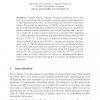Free Online Productivity Tools
i2Speak
i2Symbol
i2OCR
iTex2Img
iWeb2Print
iWeb2Shot
i2Type
iPdf2Split
iPdf2Merge
i2Bopomofo
i2Arabic
i2Style
i2Image
i2PDF
iLatex2Rtf
Sci2ools
123
click to vote
WEA
2005
Springer
2005
Springer
On Symbolic Scheduling Independent Tasks with Restricted Execution Times
Ordered Binary Decision Diagrams (OBDDs) are a data structure for Boolean functions which supports many useful operations. It finds applications in CAD, model checking, and symbolic graph algorithms. We present an application of OBDDs to the problem of scheduling N independent tasks with k different execution times on m identical parallel machines while minimizing the over-all finishing time. In fact, we consider the decision problem if there is a schedule with makespan D. Leung’s dynamic programming algorithm solves this problem in time O log m · N2(k−1) . In this paper, a symbolic version of Leung’s algorithm is presented which uses OBDDs to represent the dynamic programming table T. This heuristical approach solves the scheduling problem by executing O(k log m log(mD)) operations on OBDDs and is expected to use less time and space than Leung’s algorithm if T is large but wellstructured. The only known upper bound of O (m · D)3k+2 on its resource usage is trivial. Theref...
Related Content
| Added | 28 Jun 2010 |
| Updated | 28 Jun 2010 |
| Type | Conference |
| Year | 2005 |
| Where | WEA |
| Authors | Daniel Sawitzki |
Comments (0)

